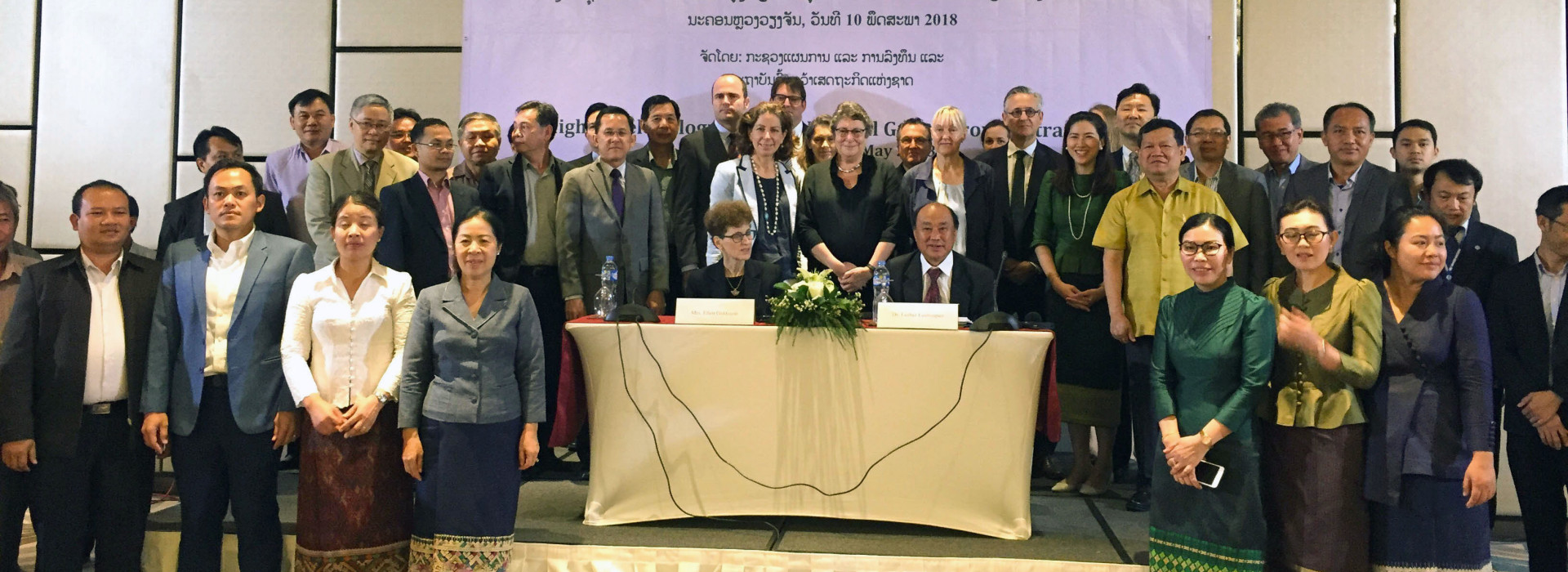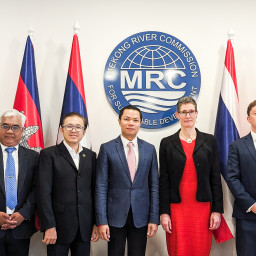Lao PDR, World Bank Encouraged to Take Stock of MRC’s Strategies and Studies in Drafting Lao National Green Growth Strategy
Vientiane, Lao PDR, 11 May 2018 – Both the Lao Government and the World Bank and Global Green Growth Institute are encouraged to consult Mekong River Commission’s strategies and studies, as they are refining a draft National Green Growth Strategy of Lao PDR, says MRC CEO Pham Tuan Phan.
CEO Pham yesterday told a High-Level Dialogue on National Green Growth Strategy in Vientiane that the MRC’s Basin Development Strategy, climate change adaption strategy “Mekong Adaptation Strategy and Action Plan”, Mekong Basin-wide Fisheries Management and Development Strategy, and, especially, recent findings from the Council Study are some of the most relevant strategies and studies that should be referred to in the process of improving the draft Lao National Green Growth Strategy.
“These strategies and findings include both regional and local perspectives that guide our Member Countries in developing the Mekong’s shared resources in a more sustainable manner in the face of climate change and rapid developments,” CEO Pham told the meeting, which was organized by Laos’ Ministry of Planning and Investment.
“I highly encourage the Lao Government as well as the World Bank and Global Green Growth Institute who finance the strategy development to consult and take stock of these strategies and studies, especially those findings from our Council Study when finalizing this draft strategy.
“Green growth is obviously a pathway to sustainable development, and I’m pleased to see Lao PDR embark on a greener economy and development as it’s important to avoid the grow now and clean up later way of doing things.”

While the findings from the Council Study, or the Study on Sustainable Management and Development of the Mekong River including Impacts of Mainstream Hydropower Projects, point out positive benefits of hydropower projects, such as an increase in economic benefits, navigation opportunities, flood protection and drought management, and more dry season flow for irrigation expansion, these development projects also bring along negative impacts, including food security issues, fish stock depletion, reduction in sediment and nutrient transport downstream, etc.
The Study, which was commissioned in late 2011 by the four Mekong Prime Ministers and completed in December 2017, recommends a cross-sector benefit-sharing mechanism in which benefits from water development projects would be shared with other sectors that suffer adverse impacts from the projects.
“And this requires a closely coordinated approach of national development planning with MRC Member Countries,” the CEO said, adding that the Study also suggests imposing levies of nine percent on hydropower on the Mekong mainstream and 19 percent on hydropower on the tributaries. He said this would prevent unsustainable hydropower projects from taking off.
The Council Study, which used US$ 4.6 million of budget from the MRC Member Countries and Development Partners and resulted in a 3,600-page plus report, assessed both positive and negative impacts of different water development scenarios on the lower Mekong basin. It aims to provide an objective scientific assessment of the environmental, social and economic costs and benefits of existing and planned water resource developments in the lower Mekong basin to inform decision makers.
The MRC Secretariat has disseminated key findings from the Study at various platforms since December 2017 and recently at the International Conference, held ahead of the 3rd MRC Summit in Siem Reap, Cambodia. These findings are also now being integrated into the MRC knowledge base to enhance the basin development planning process, including the update of the MRC sustainable hydropower strategy.
Read this article in Lao.





